Don’t believe all the things you hear – magic is very real!
There is, so they say, an exception to every rule. For Helen Lyndon Goff (aka P L Travers) it was the filming of her alter ego Mary Poppins by the arch clown of children’s movies, Walter Elias Disney. For me the exception to my own rules comes from the fact that, this once, prepared to overlook pointless historical inaccuracies (see here and here) and possibly erroneous interpretations of real life events in Saving Mr Banks for one good reason.
The reason is simple: this is as beautifully written and played as any soft-hearted and gently ironic docudrama has ever been. It is a matter of little consequence in the scheme of things, but tells a version of how one of the most loved book series became one of our most loved kiddie-friendly movies. through a creative process that engrained both a monumental transatlantic culture clash (itself ironic given Travers’ Australian roots) and more than a smidgen of amateur psychology. But then, the subtext to Saving Mr Banks is encapsulated in the one line:
“Does it matter?”
Does it matter if the vision of the writer, to whom the character is, as Thompson’s Travers says, family, is not carried out to the letter? Clearly there is a happy medium between the extremities of mood (the gravitas sought by the author against the light-hearted family entertainment intended by the studio head), and, bizarrely, the absence of red colours for no logical reason. Travers hated animations with a passion, did not want songs until, apparently, she was won over by the Kite song. If we believe this rendition, Travers hated America, Americans, movies and the whole process. All this certainly matters to the writer, but for selling the rights in exchange for a sackful of cash, compromises are inevitable.
Knowing this, Travers resisted the Disney dollar for a full 20 years before funds dried up and facing the devil in his own LA back yard proved inevitable. In hindsight we all know Mary Poppins was a roaring success, a film much loved by everyone of my generation and many more, but in the creation chalk battled cheese for its heart and soul – and with any other creative process it might have ended up a very different movie and a different character. We often see behind-the-scenes movies but rarely the process of adaptation where personalities fight tooth and nail for principles and retaining the nugget of integrity retained within the character, something utterly dispensable to be bean counters of Hollywood. They care only that the finished result sells.
The film’s contention, told through its many flashbacks, is that Travers’s kindly, loving, charismatic but alcoholic father (Travers Goff – Colin Farrell, who I saw recently in an almost unrecognisably different mode as an Irish hit man in In Bruges) is the source of the emotional turmoil within the Poppins books. The title and the name might appear a dead giveaway, though I’m quite certain there was far more to it in reality. But then a movie wants black-and-white, so there it is. Truth be told, the flashbacks are the flattest ingredients in the mix, and maybe a re-edited version would reduce this layer of the pudding to more manageable proportions, not that it isn’t beautifully played.
Also worth saying that in true Hollywood style a few unnecessary dollops schmaltz are laid on towards the end of Saving Mr Banks, directly contradicting Travers’s instruction that the Poppins movie should be entirely without whimsy and sentiment, but for the movie’s virtues I can forgive a lot. Prime among said virtues are the towering performances of two veteran Oscar winners, Emma Thompson and Tom Hanks.
The recordings of Travers over the closing titles indicates that Thompson got the polished elocution and crabby mannerisms off to a tee; she delivers tart and eloquent put-downs with the sort of well-bred relish you would expect of Fanny Craddock, keeping just enough teasing hints of her character’s hidden depths dangling like a glimpse of a stripper’s frilly knickers. Frankly she is superlative, unmissable; it’s hard to know how Thompson could possibly have improved on this portrayal, even if the tears in the premiere were actually for different reasons – allegedly.
Meanwhile, Hanks has matured nicely as an actor, such that he now fits into the comfortable shoes of the amiable control freak that was Disney as if they were made to measure. Forget the modern breed of stars, this is character acting par excellence, and the film is much the better for choosing talent first and foremost. This policy thankfully extended into the minor roles and cameos, such that the splendid Paul Giametti, Bradley Whitford, Ruth Wilson and Wes Anderson regular Jason Schwartzmann, among others, demonstrate clearly they are there on merit.
The ensemble is fuelled by a fizzing script by Kelly Marcel and Sue Smith, but it is with Thompson and Hanks together that the words on paper crackle with dramatic tension and electric energy. Sparks truly fly! Not merely waspish asides and pithy put-downs either, but with coherence matched only by the character development played out alongside the tale of Travers’s own father.
Having the cast is one thing, but credit to director John Lee Hancock for conducting his orchestra to such fine effect. This is why we go to the movies: not to see people blasted to smithereens but to see a 360-degree portrayal of human personality and interaction, which, in my humble estimation, offers the sense of soaring satisfaction we all seek. Both have their solo spots, culminating in Disney’s trip back to London to deliver a glorious but rambling monologue about his own childhood, which finally persuades Travers to come back and to entrust him with the rights and finish the movie. Whether this actually took place is not recorded, though in any sensible world it certainly should have done.
Praise also for the look and feel of the picture, capturing 60s London and LA with the sort of effortless precision that disguises many thousands of hours of work for production designers, props buyers, costume designers and many more besides.
In short, I enjoyed and was totally absorbed by this movie more than I ever expected to be, despite or maybe because of the enthusiastic delight with which friends had lavished the production. I can’t argue with this one – they were quite right and my cynicism was totally uncalled for. You will be richly entertained by Saving Mr Banks, and, I hope, spellbound by Ms Thompson.

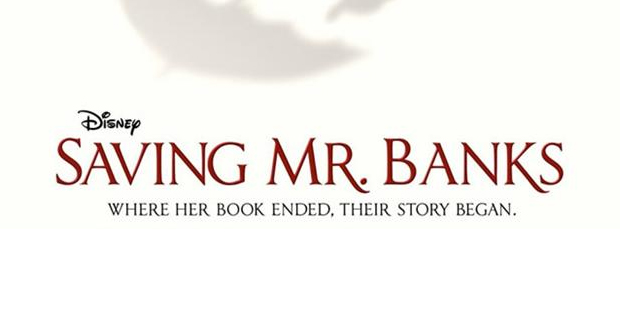

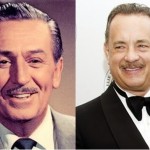
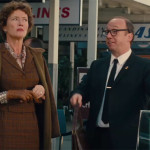
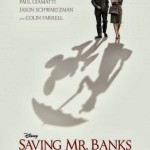


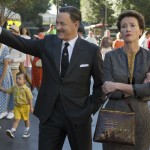

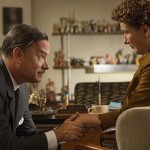
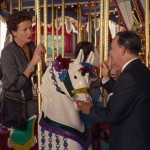

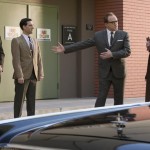
I thoroughly enjoyed ‘Saving Mr Banks’ and for our generation, we were already aware of what the film was about. The acting was first class, and ever since ‘Luther’ I have been a big fan of Ruth Wilson’s (not even ‘The Lone Ranger’ damaging her). I agre that the flashbacks were a bit overlong, though you can see what the point of them was, and a bit more of the duel between Travers and songwriters would have been fun.